Here is a little bit about Merida, Nicaragua, on Isla Ometepe. It is a small, somewhat spread out community near the southern end of the island. The economics are subsistence agriculture and some tourism. People have chickens, pigs, and horses—one of the alternate means of transportation, in addition to foot, bikes, motorcycles, motor vehicles, and the Chicken Bus. People fish, gather mangos, garden, or have larger plots where they farm. Plantain is a major crop. There is a sweet variety that is usually fried. The non-sweet version is used like a potato.
Cautions…about Mangos? I learned that the many 60-year-old mango trees in Merida were planted during the Samosa regime to serve as a wind break. They line one side of the main road through Merida for some distance, as well as some side paths. The large trees create an arbor of shade—and a source of mangos. The trees are all tall enough, now, that the fruits are mostly out of reach. Sometimes you can knock the lower hanging fruit with a long pole. Kids will throw rocks into the trees trying to knock a mango loose; that effort seems to have a low success rate, but enough to keep the kids trying. Mostly, mangos simply fall to the ground and are harvested by just picking them up. This is a good morning activity, when the freshly fallen mangos from the previous night have not been baked by the sun.
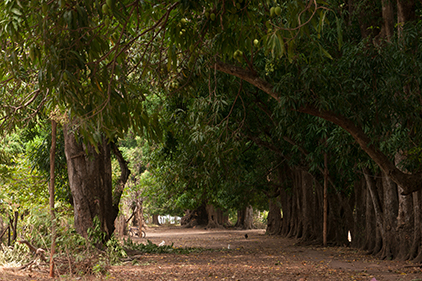
Part of the morning chorus.
That the fruits will fall out of trees, at random times, just when they feel like it, presents a bit of a hazard. Walking back from the small three-table restaurant in Merida we went to the first night, on the walk back to the house, I got nailed on the head by a mango. I was unhurt, just surprised. It was a glancing blow, but reminded me of a similar “tree attack” in France, when I got “battered” by a bunch of chestnuts while bike touring—but that is another story.
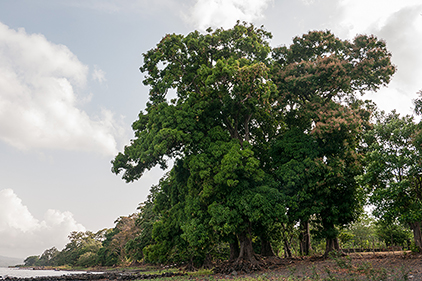
Three mangos falling and hitting the ground.
Who consumes mangos? People, horses, oxen, pigs, goats, chickens…but apparently not dogs, or they would not all be so skinny. A freshly fallen, tree-ripened mango is nothing like what you can buy in US grocery stores…sweet, juicy, wonderful.
As I write this, the temperature is 90°F on the shaded porch, with a relative humidity of about 66%. Coming from the land of "heating degree days" in Juneau, Alaska, I am learning about the other end of the discomfort index. The current conditions in Rivas, the closest town that has a weather service forecast, indicates the temperature and humidity combine to feel like 100°F. The breeze barely cools.
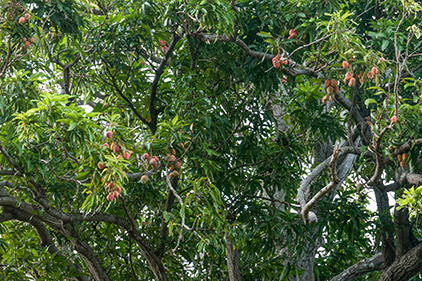
Morning chorus. The bird that sounds like a car alarm is probably the Great-Tailed Grackle.
Suffering from the heat of mid-day, I was lazing in a hammock (something those who know me will be incredulous about, Mike lazing? But, the enthusiasm to do anything much (for me, anyway) when it is hot and humid can be hard to come by). I had water within reach, as well as a book (The Sound Book, by Trevor Cox), my camera, binoculars, and my recorder connected to a directional mic on a tripod aimed at a tree, in case something landed there and made noise.
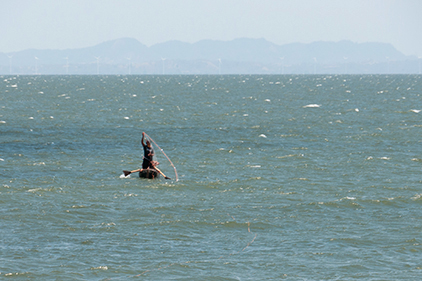
I am not sure what this bird is, in the audio clip. It was captured by an unattended mic and recorder.
I have been watching five men fishing from the lake shore with nets. They have a long net that they pull from shore with a dugout canoe and loop it back to shore in a “U.” The ends of this net are pulled ashore, concentrating the fish. Some get caught in the net and are harvested as the net is pulled in. As the net pulls closer to shore, a circle net is tossed onto the concentration of fish to aid in harvesting. The last 20 feet to shore, the fish are tossed ashore, where kids will put them in pails or bags. These are small, hand-sized fish that I understand are simply gutted and fried.
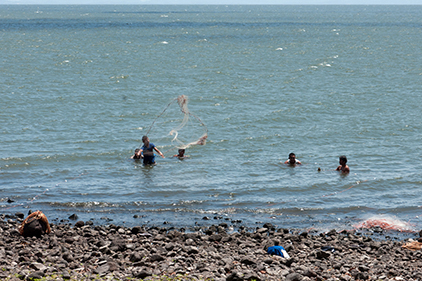
Shore work. Five men pick the nets, dive under to grab fish. A team effort. A circle net being tossed to facilitate harvesting the fish.
May is supposed to be the rainy season in Nicaragua. This should be the end of the dry season. But, so far, this year, it has rained little. Trees that during the rain season that would be green are waiting for rain. Grasses are dry and brown. At the house, water sometimes stops. All of the water for Merida has to have fallen on the volcano. But, by the end of the dry season, it has been months since the last rain. Roads and paths are dry and dusty. There was a significant but brief rain shower a couple evenings ago. VERY noisy under the corrugated metal roof of the house.
Tropical rain shower, tin roof, noisy combo.